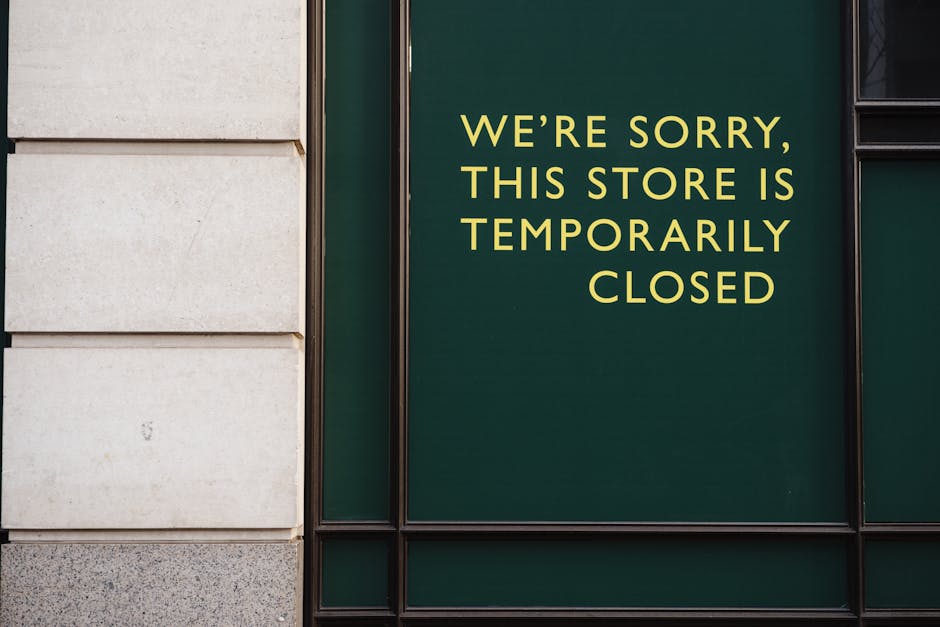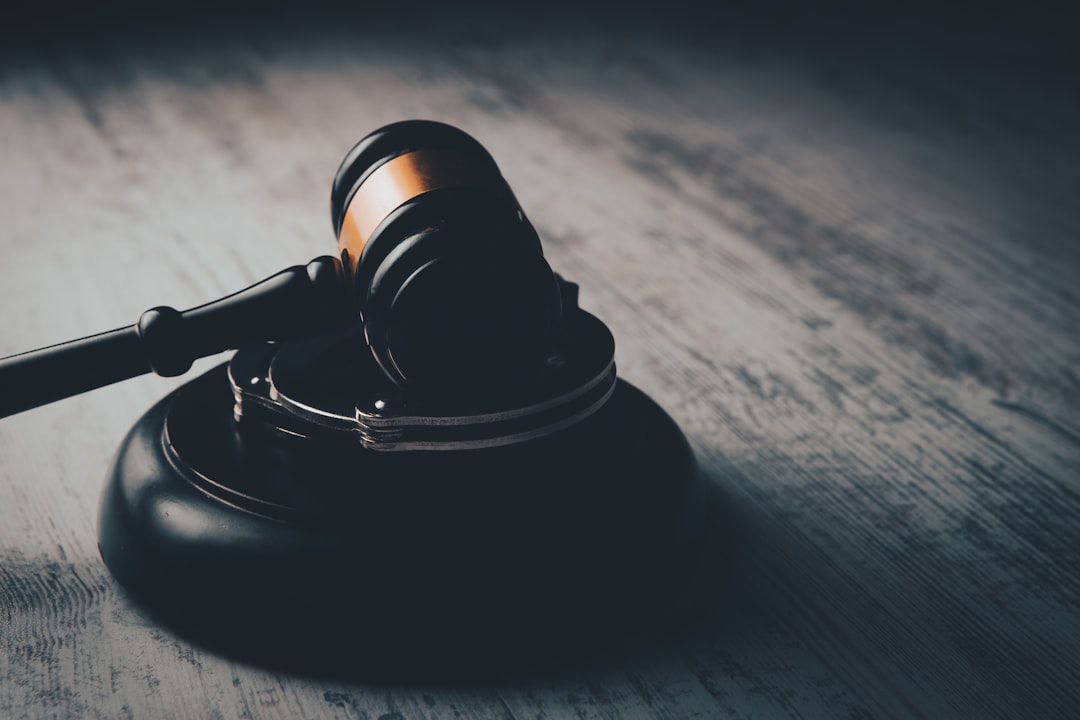Why Business Interruption Coverage is Your Financial Lifeline When Disaster Strikes
Business interruption insurance is a critical financial safety net when a covered disaster forces your commercial property to temporarily close. This coverage replaces lost income and covers ongoing expenses during the restoration period, helping businesses survive what could otherwise be a catastrophic financial blow.
Key Coverage Elements:
- Lost Income Replacement: Compensates for revenue you would have earned.
- Operating Expenses: Covers fixed costs like rent, payroll, and loan payments.
- Extra Expenses: Pays for temporary relocation and increased operational costs.
- Restoration Period: Provides coverage until normal operations resume.
According to FEMA data on business closures, about 25% of businesses fail to reopen after a disaster strikes, making this coverage essential. The 2024 Allianz Risk Barometer even identifies business interruption as a top global business risk, cited by 31% of enterprises.
When a fire, hurricane, or other covered peril damages your commercial building or multifamily property, business interruption insurance is your financial bridge to recovery. While property insurance covers physical repairs, this coverage ensures you can pay bills and employees while getting back on your feet.
I’m Scott Friedson, a public adjuster who has settled over $250 million in large loss claims. My experience with commercial properties across Texas helps policyholders maximize their business interruption settlements and avoid unnecessary litigation.
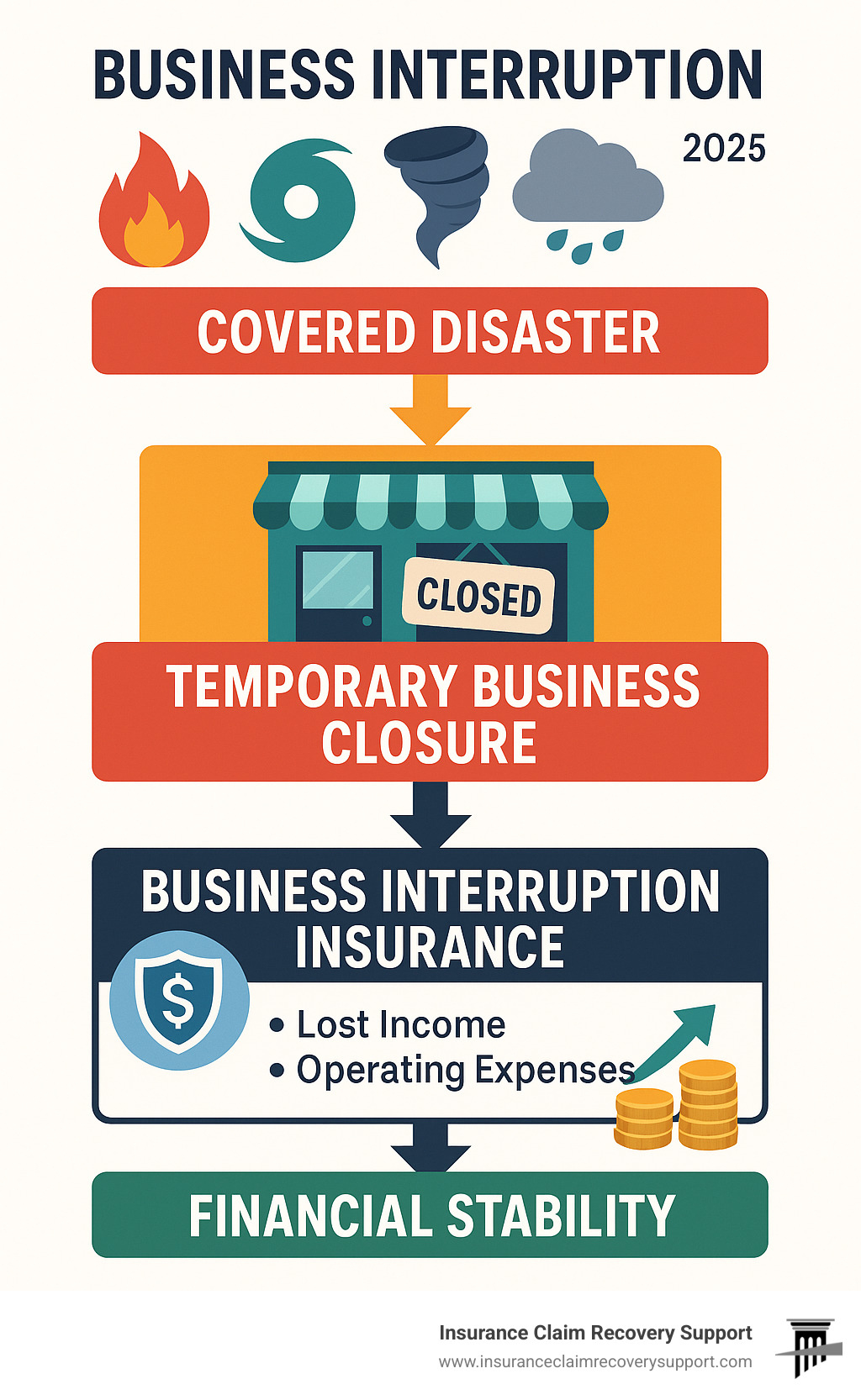
Important bsuiness interruption terms:
Understanding Business Interruption Insurance: Beyond Property Damage
When a hailstorm damages your Austin commercial building or a fire breaks out in your Houston multifamily complex, property insurance covers the physical repairs. But what about the income you lose while repairs are underway? That’s where business interruption insurance becomes your financial lifeline.
Also known as business income insurance, this coverage goes beyond standard property policies. While property insurance fixes physical damage, business interruption coverage protects your cash flow and financial stability during the recovery period.
This specialized coverage is often included in a Business Owner’s Policy (BOP) or added as an endorsement. The key requirement is direct physical loss from a covered peril that suspends your operations. Whether it’s wind damage in Dallas or freeze damage in San Antonio, the trigger is always physical damage that disrupts your business.
What is Business Interruption Insurance?
Think of business interruption insurance as a financial bridge. When a covered disaster closes your doors, this coverage replaces your lost income and covers operating expenses that don’t stop, like rent, payroll, and loan payments. It ensures these critical expenses are met, maintaining your financial stability.
In Texas, where severe weather is common, adequate business interruption coverage is essential for survival. For more insights, see A Guide to Commercial Claims in Texas.
How It Differs From Property Insurance
The difference is simple: property insurance covers physical assets, while business interruption covers financial losses.
Property insurance pays for the rebuilding costs—the repair of your building and replacement of damaged equipment. Its goal is to restore your physical assets.
Business interruption insurance, on the other hand, covers the financial loss from the shutdown. It pays for lost revenue and ongoing expenses while your property is being repaired. These two coverages are separate but complementary protections.
| Feature | Business Interruption Insurance | Commercial Property Damage Insurance |
|---|---|---|
| Primary Focus | Financial losses (lost income, ongoing expenses) | Physical damage to buildings, equipment, inventory |
| Trigger | Suspension of operations due to covered physical damage | Direct physical damage to insured property |
| What it Pays For | Lost profits, payroll, rent, taxes, relocation, extra expenses | Repair or replacement costs of damaged property |
| Purpose | Maintain financial stability, ensure business continuity | Restore physical assets to pre-loss condition |
Understanding this distinction is vital for Texas property owners. Learn more about state-specific challenges in Why Commercial Claims Are Different in Texas. You need both types of coverage: one to rebuild your property, and the other to keep your business financially sound during the process.
What Your “Bsuiness Interruption” Policy Actually Covers (and What It Doesn’t)
Understanding your bsuiness interruption policy is crucial, as its specific terms, endorsements, and riders can make or break your claim. After handling hundreds of commercial claims across Texas, I’ve seen too many business owners blindsided by coverage gaps. Knowing your policy before a disaster can save you thousands. For a broader overview of potential losses, see Loss Types.
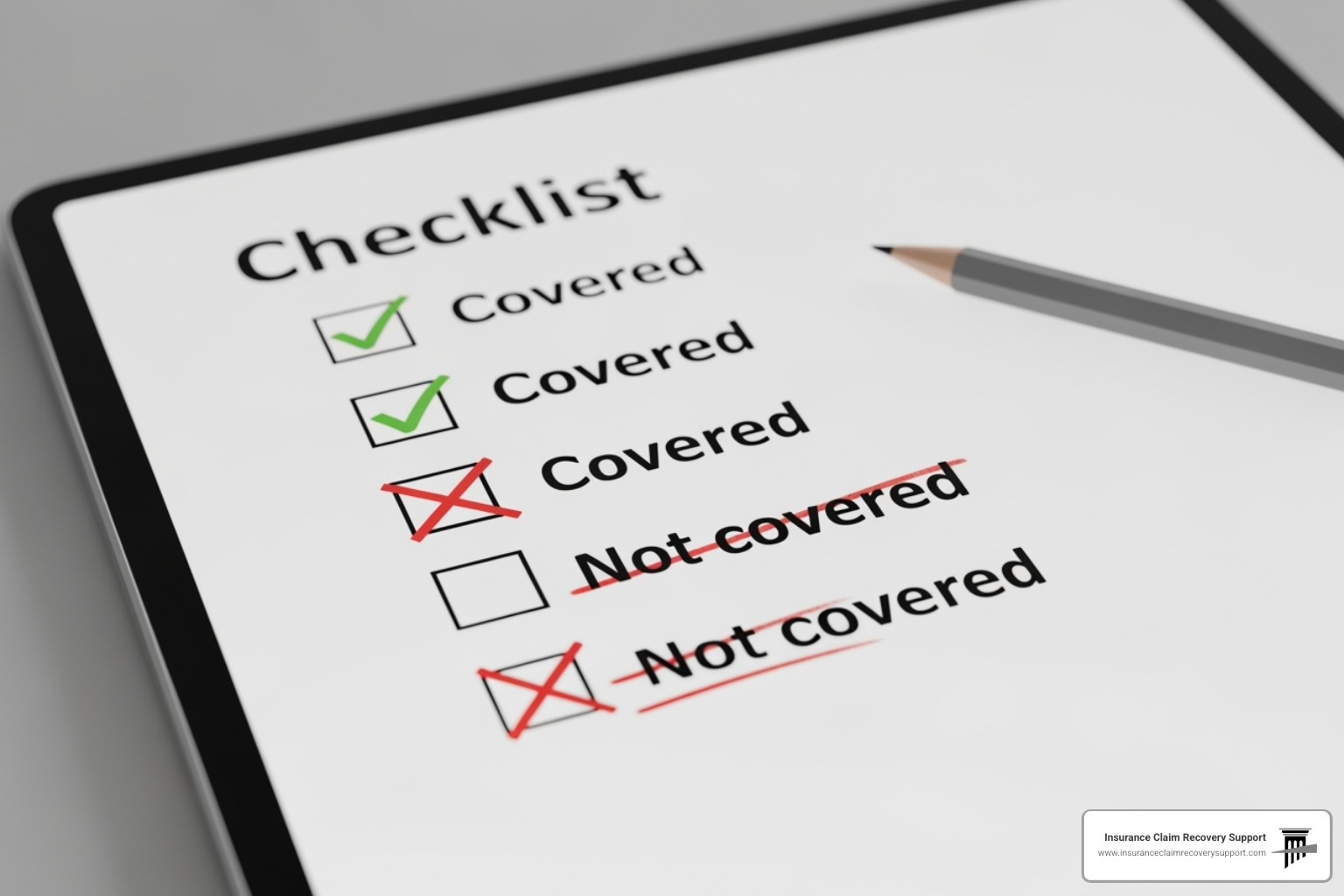
Covered Losses and Expenses
When a covered disaster closes your business, your policy aims to put you in the same financial position you would have been in otherwise. Key coverages include:
- Lost net profits: Based on your financial records and reasonable projections.
- Fixed costs: Ongoing expenses like payroll for key employees, rent or mortgage payments, property taxes, and loan payments.
- Relocation costs: Expenses for moving and operating from a temporary location.
- Extra expenses: Additional costs to speed up recovery, such as overtime pay or renting equipment.
For multifamily property owners, this also covers lost rental income from damaged units. These details are critical in Multi-Family Property Claims.
Common Triggers for Coverage
Coverage is typically triggered by direct physical damage from a covered peril. Common triggers in Texas include:
- Fire and smoke damage: A leading cause of shutdowns. Learn more about Fire and Smoke Damage Insurance Claims.
- Commercial wind damage: From severe storms that damage roofs or windows. See our Commercial Wind Insurance Claims guide.
- Tornado damage: Can render a property completely unusable for long periods.
- Hurricane damage: A major threat to coastal and inland Texas properties. Our Hurricane Texas page has specific guidance.
- Freeze damage: Burst pipes can cause significant water damage and shutdowns.
- Flood damage: Usually requires a separate policy or endorsement. Our Flood Claim resource can guide you.
Key Exclusions and Limitations
Knowing what isn’t covered is just as important. Common exclusions include:
- Pandemics and communicable diseases: After the SARS outbreak, insurers added virus and bacteria exclusions. Because COVID-19 did not cause direct physical loss or damage in the traditional sense, related claims were widely denied.
- Undocumented income: If you can’t prove income with financial records, it won’t be covered.
- Utility outages: Power grid failures are typically excluded unless they result from physical damage to your own property.
- Flood and earthquake damage: These require separate policies or specific endorsements.
When claims are denied, it’s important to know your options. See our page on Denied Storm Damage Insurance Claim for more information. The complexity of these details is why a public adjuster’s expertise is so valuable.
Advanced Coverage Concepts You Need to Know
Beyond the basics, several advanced bsuiness interruption concepts can make or break your financial recovery. These strategic protections address complex scenarios that can impact any commercial property, from an Austin office complex to Dallas apartment units. For guidance on Texas-specific issues, see Texas Insurance Claims.
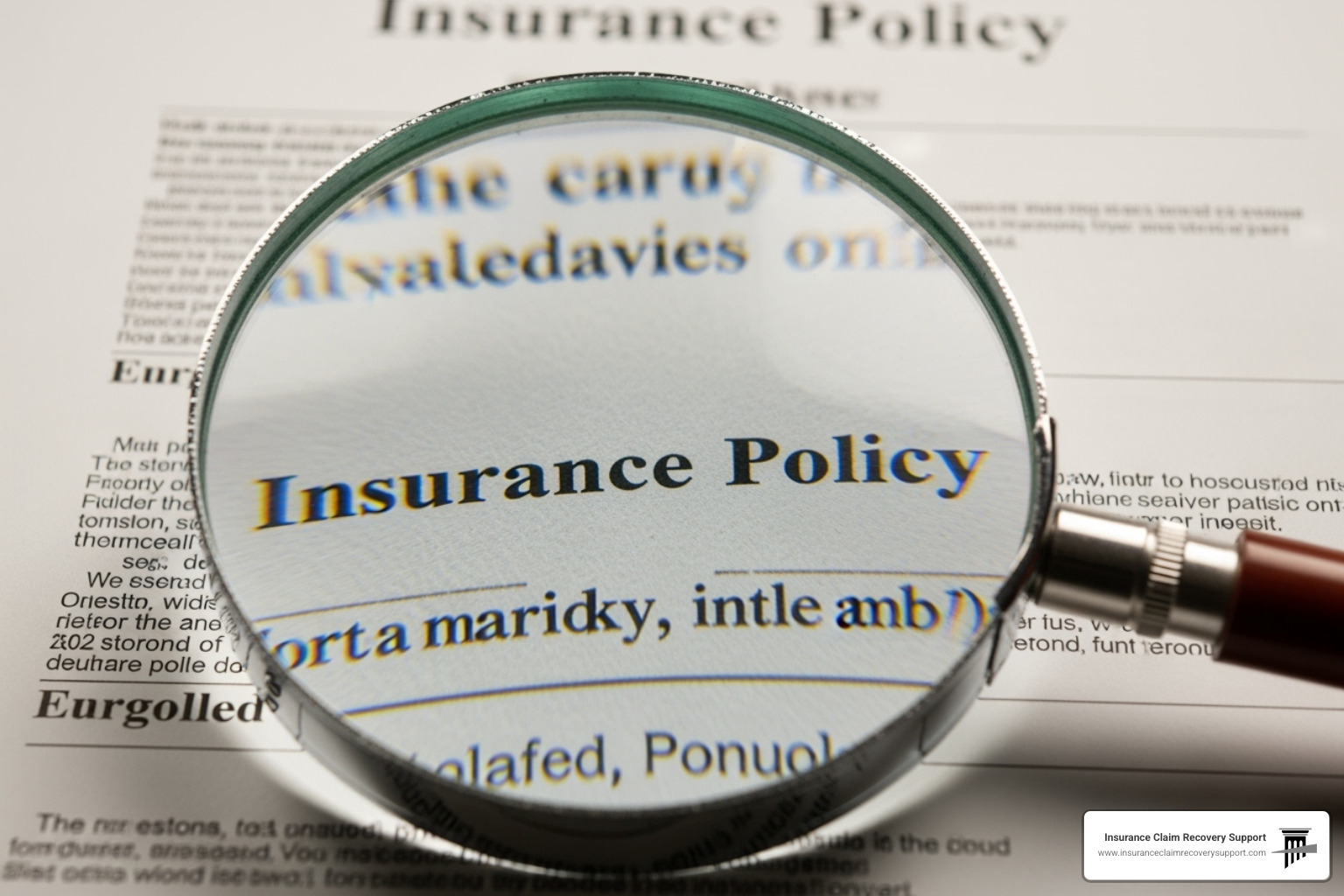
The ‘Period of Restoration’ Explained
The period of restoration defines how long your coverage lasts. It begins after a waiting period (typically 72 hours) and continues until your property is repaired and operations can resume.
However, “normal operations” may not return immediately. Customers may have gone elsewhere, and revenue can lag. This is where Extended Business Interruption (EBI) coverage is vital. EBI extends protection beyond physical restoration, covering the income gap as your business ramps back up. Expediting your claim can minimize this difficult period; learn more at How to Expedite Property Damage Insurance Claim Settlement.
Contingent Business Interruption Coverage
Your business can be disrupted even if your property is untouched. What if your key supplier’s warehouse burns down? Contingent Business Interruption (CBI) protects you from these domino effects.
CBI covers losses resulting from physical damage to a dependent property—a key supplier or customer you rely on. This supply chain protection is crucial in today’s interconnected economy. For an apartment complex, a dependent property could be a shared utility provider whose disruption makes units uninhabitable. For more on apartment claims, visit Apartment Fire Insurance Claim.
Civil Authority Coverage
Sometimes, the government prevents access to your property. Civil Authority Coverage applies when a government order prohibits access to your undamaged property due to physical damage in the surrounding area.
For example, if a nearby building explosion in San Antonio causes authorities to cordon off your block, your business is shut down despite having no damage. This coverage would cover your lost income during the government-mandated shutdown. The requirements are strict: access must be prohibited due to nearby physical damage from a covered peril. This is common after natural disasters that lead to curfews or evacuation orders. For more on this topic, see San Antonio Flood Damage.
Mastering Your Business Interruption Claim: From Preparation to Settlement
Successfully navigating a bsuiness interruption claim demands strategic preparation. You’re not just documenting damage; you’re proving what would have happened financially. With FEMA reporting that 25% of businesses fail to reopen after a disaster, effective claims management is a matter of survival. Proper preparation can help you avoid common pitfalls and disputes. Learn more about Top Mistakes in Commercial Property Damage Claims.
Before a Loss: How to Prepare for a “Bsuiness Interruption” Claim
Smart preparation begins long before a disaster.
- Conduct a business impact analysis: Understand how a disaster would affect your critical operations and estimate recovery times.
- Calculate coverage needs accurately: Use gross earnings and realistic projections to determine your required coverage limits. Don’t just guess.
- Keep valuations current: Update your policy at renewal to reflect your business’s current value and operational realities, a process similar to what’s needed for Evaluating the Worth Insurance Claims for High Value Homes.
- Maintain meticulous financial records: Detailed documentation of income, expenses, and payroll is the foundation of a successful claim. Undocumented income will not be covered.
After a Loss: Navigating the Claims Process
When disaster strikes, your immediate actions are critical.
- Notify your insurer immediately to start the claims process.
- Mitigate further damage by making temporary repairs and securing the property.
- Document everything: Keep detailed logs of all expenses and track lost income with precision.
- Provide comprehensive records: Your insurer will require profit and loss statements, sales records, payroll information, and tax returns to measure your lost income.
Following these steps is key to a smoother settlement. Learn the strategic approach in How to Steer Commercial Property Claims in 5 Easy Steps.
Why “Bsuiness Interruption” Claims Get Complicated (and How a Public Adjuster Helps)
Business interruption claims are complex because they involve proving financial hypotheticals. The burden of proof is on you to calculate lost profits, a process that often leads to a Claims Dispute.
This is where a public adjuster provides critical value. Unlike the insurance company’s adjuster, a public adjuster is your exclusive advocate. We level the playing field.
- Expertise: We bring in forensic accountants to accurately calculate your lost income and extra expenses, ensuring nothing is overlooked.
- Advocacy: We understand complex policy language and negotiate on your behalf to secure the maximum coverage you deserve.
- Avoiding Litigation: Many claim disputes end in expensive, time-consuming lawsuits. A public adjuster’s goal is to achieve a fair settlement through negotiation, presenting a well-documented claim that encourages resolution without going to court. This process is faster, less stressful, and more certain than litigation.
This professional advocacy is invaluable for complex commercial claims. Learn more about our role at Why You Need a Public Adjuster for Commercial Claims and understand the Public Adjuster Definition.
Frequently Asked Questions about Business Interruption Insurance
When disaster strikes, questions about bsuiness interruption insurance arise quickly. As a public adjuster who has handled hundreds of these claims across Texas, here are answers to the most common concerns from property owners.

How much business interruption coverage do I need for my commercial property?
This is a critical decision. Start by calculating your gross earnings and factoring in growth trends. Then, engage in worst-case scenario planning. A retail shop might recover in weeks, but a manufacturing facility or apartment complex could be down for over a year. Consider your industry—specialized facilities face longer recovery times. Given rising construction costs in Texas, it’s wise to have more coverage than you think you need. The trend is explored further in The Rise of High Value Real Estate Claims in Texas.
What is the impact of pandemics on business interruption coverage?
The COVID-19 pandemic highlighted a major gap in coverage. Standard bsuiness interruption policies require direct physical loss or damage to trigger a claim. Courts have consistently ruled that a virus does not cause this type of damage. After the SARS outbreak in 2003, insurers began adding specific virus exclusions, which are now standard. As a result, the vast majority of COVID-19 claims were denied. Some argue this is part of a pattern of Insurance Industry Fakes Crises Invents Social Inflation. Don’t expect your standard policy to cover pandemic-related losses.
How are business interruption claims settled and what documentation is required?
Settling a bsuiness interruption claim is a complex process of proving what your business would have earned. After you notify your insurer, they will assign an adjuster and likely a forensic accountant. Having a Public Adjuster in Texas on your side provides you with your own expert advocate.
The documentation requirements are extensive. Be prepared to provide:
- Profit and loss statements (several years)
- Tax returns
- Sales and production records
- Payroll records
- Lease agreements or mortgage statements
- Invoices for extra expenses
- Bank statements
- Contracts with suppliers and customers
Gathering and presenting this information while rebuilding is a major challenge. A public adjuster manages this entire process, negotiating with the insurer to achieve a fair settlement based on a thoroughly documented claim, like those detailed in The Process of Multi-Family Insurance Claims.
Conclusion
When disaster strikes your commercial property, bsuiness interruption coverage is your financial lifeline—the key to turning a potential business failure into a comeback story. As seen across Texas, from Houston to Dallas, proper coverage is a cornerstone of a business survival strategy.
Proactive planning is your first line of defense, but even the most prepared owner can be overwhelmed by a complex claim. At this point, you face a choice: engage in expensive, time-consuming litigation with an uncertain outcome, or partner with a public adjuster who represents your interests exclusively.
A public adjuster offers a path focused on negotiation and documentation to maximize your settlement without courthouse drama. We speak the insurer’s language and work to get you a fair result quickly, avoiding the litigation trap that ensnares so many property owners.
At Insurance Claim Recovery Support, we’ve settled over $250 million in large loss claims. We know every day your doors are closed is money lost forever. We work aggressively to expedite your claim, whether it’s for a Fort Worth warehouse or an Austin apartment complex.
Your business resilience depends on having the right advocate. Don’t let an insurance company determine your future. Learn more about our approach at The Process of Multi-Family Insurance Claims and let us turn your complex claim into a maximum settlement.

